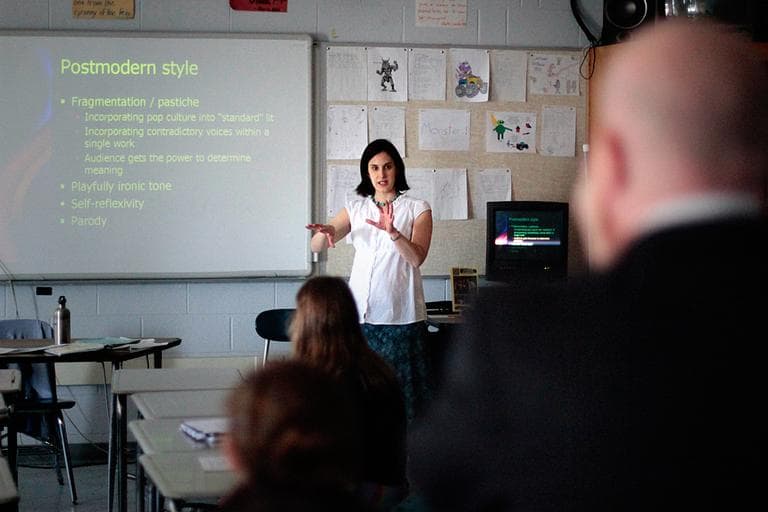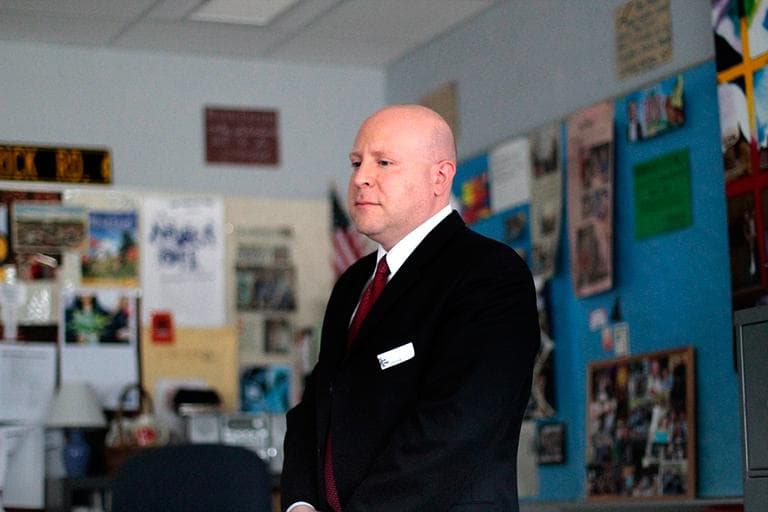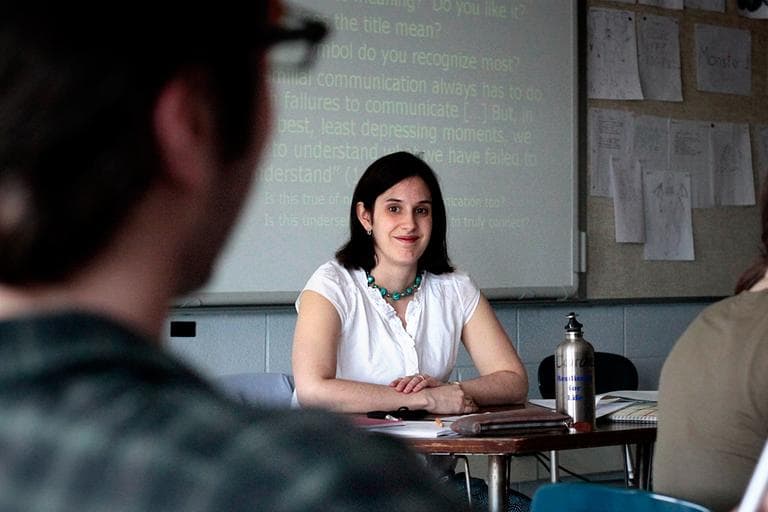Advertisement
Uncertain Test Score Evaluation System Worries Teachers
Resume
The effectiveness of the teacher is one of the most important factors in a student’s individual achievement. And yet for decades schools have been failing to consistently and effectively evaluate teachers, says Massachusetts Education Commissioner Mitchell Chester.
"At its worst it's neglected and we know that a lot of teachers report they are rarely evaluated," Chester says. "They may go years without being evaluated. It’s often perfunctory."
Over the next three years that will change significantly as the state implements a new evaluation system to qualify for federal Race to the Top funding. The most controversial element of the new system is a requirement to use student test scores to rate the teachers.
The New Evaluation Process
For decades teachers have been evaluated primarily on how they run their classroom. Alison Courchesne’s room is set up in a horseshoe of desks and she’s standing as the kids arrive.
She runs her 12th-grade literature class at Framingham High School more like a college seminar, asking students to call on each other when they are finished speaking. I’ve asked Jason Williams, of Stand for Children, an education policy advocacy group, to come with me to Courchesne’s class to evaluate her teaching, using the new standards proposed by the state.

"Usually when you walk into the classroom within the first 5-10 minutes you can get a sense of whether or not there’s great learning happening," Williams says.
That’s one of the four new criteria on a checklist teachers will be judged on — curriculum and instruction — and Courchesne gets a check in that box, Williams says. Speaking to me at the back of the classroom, he says Courchesne also gets a check in the box for teaching all students.
"As the students were arriving in the classroom she wasn’t just static," Williams notes. "She was spending time greeting them, interacting with them, making it clear she’s an active participant in their learning and really cares about them."
Courchesne will also be judged on how well she engages with the students' families. Check. She emails frequently with them. Does she contribute to the after-school culture and professional growth? Check and check. She started a poetry slam, attends basketball games and organized a weekly after-school staff yoga class. High marks all around.
Controversial Test Scores
All of these factors make up about half of her performance review in the future. The other half? It's a controversial criteria: are her students learning? Courchesne says she’s confident her teaching ability will be reflected in her students' tests, but she doesn’t want to be solely evaluated on that.
"I want a kid to walk out, not just with knowledge of grammar, but also good self-confidence and to feel like they’ve had a good day," Courchesne says. Those, she notes, aren't measured by a test.
But how much a student learns in Courchesne's class will be major part of her evaluation, Chester says.
"Student learning becomes central," Chester says. "You need to look at various sources of student learning, not only one source, where we have MCAS scores... these, they have to be used but they can’t be used as the sole source."

In fact, less than one in five teachers are in a grade and subject that gives MCAS. There are other problems with only using the MCAS to rate teachers. It’s only given once a year, so it doesn’t measure student growth. Teachers don’t get the scores until months later.
Paul Toner, head of the Massachusetts Teachers Association, says teachers agree student learning should count in their evaluations.
"What they don't want is a one-shot standardized test score being determinative of their entire career," Toner says. "If you’ve got kids who came to school hungry, came to school tired, and their entire career is gonna ride on a test score? Absolutely not," he adds emphatically.
Hilary Shea, a fifth-grade teacher at Mason Pilot Elementary School in Boston, has seen students fail tests because of what’s going on at home.
"I’ve had the kid who's come in and you know what? His dad decided to move out that night before," Shea says. "And he bombed the test and he was proficient reading. Is that an accurate reflection of my teaching or that kid’s ability? No."
Negotiating The Checklist
But how do you show learning? The state says you need to use multiple measures — these could be reading comprehension tests developed by each school or district or pop quizzes in math that show a student is learning multiplication. There's a lot about the new evaluation system that's left to be decided by each school district because teachers have the right to negotiate what their evaluation checklist will be.
"I’ll give you one message that every superintendent I talked to will speak to, and that is: do not leave all of this into the collective bargaining process because it’s going to get watered down and we are going to have no consistency across the state," Tom Scott, head of the Massachusetts Association of School Superintendents, recently told the state Board of Education.
The board is expected to hear more concerns about the proposed evaluation system at a hearing Tuesday and is expected to adopt the new evaluation system at the end of June.
Back in Alison Courchesne’s classroom, she worries that her future evaluations, which will focus on tests, still may not capture what makes a teacher really great.
"How do you put a number on how much you love the kids?" Courchesne wonders.
There is no box to check for that on the state's new evaluation form.
This program aired on May 24, 2011.